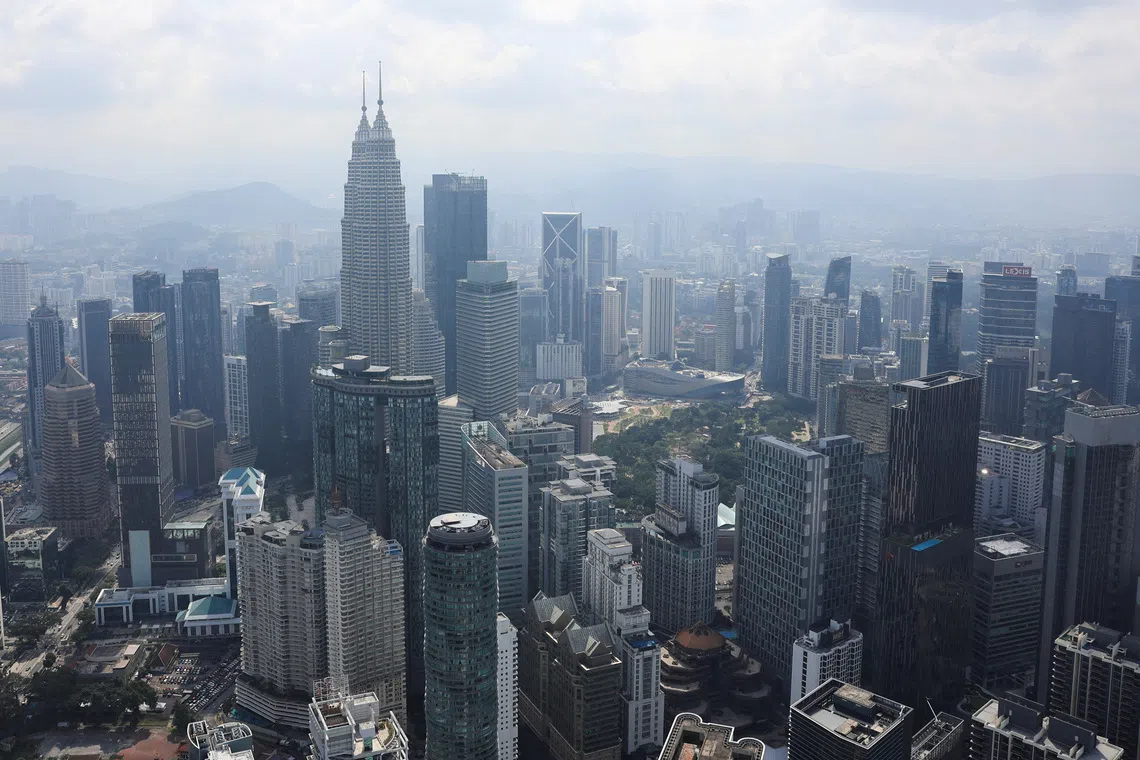Malaysia faces renewed calls to rewind the clock, 40 years after shifting to GMT+8
Sign up now: Get ST's newsletters delivered to your inbox

While Kuala Lumpur and Singapore sit on similar longitudes as Bangkok and Jakarta, both operate an hour ahead.
PHOTO: REUTERS
Follow topic:
- A Malaysian minister's post about morning run has reignited debate on Malaysia's time zone (GMT+8) and its impact on health.
- Some Malaysians feel "robbed" of morning sunlight due to the time zone, arguing it disrupts circadian rhythms and affects well-being.
- Medical experts believe lifestyle and dietary habits are bigger factors affecting health than the one-hour time difference.
AI generated
KUALA LUMPUR - A light-hearted X post by a Malaysia minister on a morning run in Kota Kinabalu, Sabah, has revived debate over whether Peninsular Malaysia and Singapore are in the wrong time zone, which some claim risks the health of over 36 million people.
While Kuala Lumpur and Singapore sit on similar longitudes as Bangkok and Jakarta, both operate an hour ahead, sharing the same time zone as Manila even though the Philippine capital lies some 2,500km to the east.
The mismatch means the sun rises at around 7am in Peninsular Malaysia, compared with about 5.30am in Jakarta and 6am in Manila, where the time zones are more closely aligned with their geographical longitudes.
Sunrise in Sabah and Sarawak is between 6am and 6.30am, even though the eastern states share the same time zone as the rest of Malaysia.
People in Peninsular Malaysia get only two hours of morning light before the 9am workday begins, while schoolchildren start classes at 7.30am – barely half an hour after sunrise.
Minister of Investment, Trade and Industry Tengku Zafrul Aziz, an avid runner, recently remarked on this phenomenon, saying that because the sun rises early in Kota Kinabalu, he was able to go for a run ahead of his 8.30am event.
“I bumped into many KK runners today! Power! Let’s continue to practise a healthy lifestyle,” he said in a post on X on Nov 9.
His post was peppered with replies calling for Peninsular Malaysia to be “brought back to GMT+7” – the time zone used in Thailand and west Indonesia. Some said that Peninsular Malaysians had been “robbed” of a similar lifestyle, with no time to enjoy the morning sun, disrupting their circadian rhythms.
A circadian rhythm is the body’s natural 24-hour cycle of physical, mental and behavioural changes, often called the body clock. This internal clock, influenced primarily by light and darkness, regulates sleep-wake cycles, hormone production, body temperature and other essential functions.
Time in Peninsular Malaysia was previously set at GMT+7.30 after the Second World War in 1945, before being brought forward by half an hour on Jan 1, 1982 by Prime Minister Mahathir Mohamad to synchronise Peninsular Malaysia with the Borneo states of Sabah and Sarawak.
Singapore followed suit to “avoid inconvenience to businessmen and travellers”.
Calls to rewind the clock in Malaysia have circulated for years on X, led by a small online community that urges people to seek more sunlight, arguing it could remedy health problems from diabetes to obesity.
This issue was raised in Parliament in March 2024, to which the government responded that while it was aware of the health argument, any changes to the existing arrangement could have a “significant impact on the economy”.
“The government is not willing to shift away from what was decided in 1981,” said then Minister of Investment, Trade and Industry Liew Chin Tong.
But the idea has since gained wider attention, including from 35-year-old insurance agent Meor Haqimy, who replied to Datuk Seri Zafrul’s post. Mr Meor said his frequent trips to Sabah and Sarawak convinced him that earlier daylight makes for a more fulfilling day.
“We start our day earlier, with exercises before going to work, unlike here where we drive to work in the dark,” he told The Straits Times.
Others share the sentiment, including retired marine logistics manager Kassim Che Mat, originally from the north-eastern state of Kelantan, who enjoyed morning walks in the sun before clocking in each day.
“I told my children that if I had experienced this earlier in my career, I would have opted to move to Borneo permanently,” said Mr Kassim, who worked in Kota Kinabalu for five years before retiring to his hometown in Bachok, Kelantan.
Medical experts contacted by ST, however, are unconvinced that the one-hour difference is a big enough problem to health.
Dietitian Nurul ‘Aqilah Hasan Ashaari from the Malaysian Health Ministry pointed out that Brunei has the second-highest proportion of people with diabetes in South-east Asia, after Malaysia, despite being in the “right” time zone.
The International Diabetes Federation reported that 57 out of every 1,000 Bruneians suffer from diabetes, with the number of cases more than doubling from just under 20,000 in 2011 to almost 44,600 in 2024.
Mdm Nurul ‘Aqilah said that while a time zone change may create a slight mismatch between solar time and social schedules, everyday lifestyle patterns including sleep timing, working hours and late meals play a far larger role in circadian alignment and metabolic health.
“Time zone is just one factor and should not be the sole determinant. It is very much a behavioral issue,” she said.
The 2024 National Health and Morbidity Survey by the Health Ministry found that a third of Malaysians and two-fifth of the country’s youth consume late, heavy meals at least once a week. Across the country, mamak restaurants selling greasy fried dishes and sweet drinks are popular, with many operating around the clock.
Such eating habits disrupt sleep quality, induce digestive problems and increase risks of heart diseases as well as type 2 diabetes.
Mdm Nurul ‘Aqilah said that even if the clock is moved back by one hour, it does not guarantee better health unless these behavioural issues are addressed.
“The thing is people are more sedentary and food is abundant,” she said. “It’s the same everywhere and is a global issue rather than just a time zone issue.”
Sign up for our weekly
Asian Insider Malaysia Edition
newsletter to make sense of the big stories in Malaysia


